#i love ace attorney so much but like 80% of what inspires me to make actual fan content is. other fans and i havent seen anything in a while
Text
I'm not vaguing anyone with this post it's not about a specific person
Being an ace attorney fan is so crazy because like. Ok so listen. Firstly. This game has been out for 22 years. A lot of people have talked about it but i think theres still stuff that could be said but like. Visualize canon as a circle. Now picture a ring around it like it's outer and separate and that's fanon. And I feel like the viewpoint of the average ace attorney fan at least currently is just that those two circles are the same circle and like. Idk it's really frustrating because within the context of fanon a lot of the characters become so flat and one dimensional. It's like. Ok I'm sorry I'm going to talk about trucy for a second. Like trucy in her fanon characterization is nothing except a magician. She is never a liar and never a teenager and never a performer except in the sense that she is literally performing card tricks and it just becomes so stale when you know there are other things that trucy is!!!it's like everyone is so scared of any depth at all and I just wish I could see 1 original take because the characters and world of ace attorney are so interesting and I wish people would. Explore them
#IM SORRY WOMEN#specifically the women of the aa universe. what have they done to you#genuinely i love ace attorney so much but like. sometimes two things can be true about a character. you guys know that right#nothing even set this off i just felt like biting#i love ace attorney so much but like 80% of what inspires me to make actual fan content is. other fans and i havent seen anything in a while#this is also where my love of krisnix comes in. krisnix is so interesting. what do you do when the guy with the savior complex attaches#himself to the man trying to ruin his life. anyway#ramblinged
13 notes
·
View notes
Note
Hello there! I'd like to request a paid pokemon team description if you please! I had previously sent in the ask for the free one but changed my mind and decided to pay for one instead. Hopefully that's alright. Lol. So where to start. I'm a 21 year old female Leo. Personality wise, I would basically boil it down to, I’m an amiable introvert. I’ve always been really shy and quiet around strangers, maybe even a bit cautious of friendships as I’ve had too many experiences in the past of (1/?)
toxic friends. However, once I perceive a person to be real and genuine, I can open up to them easily, becoming who I truly am around them: fun-loving, excitable and talkative. I have MBTI personality type INFP also known as The Mediator, which makes sense as I'm definitely the peacekeeping type. In my small group of friends, I'm basically the one who keeps them from getting into fights with each other or other people. I'm also the one who diffuses situations. I myself dislike conflict and (2/?)
will do everything in my power to actively ignore it, which may be one of my downfalls. For more positive traits, I have a high level of patience, meaning that I won’t give up on people easily even if everyone else has. I’m also very nurturing towards the people I love. I love raising people up and giving them all the support and affection I can. I’m definitely a hugger. However, more negative traits include my stubbornness and pride. These two go hand in hand really. I pride myself in my (3/?)
ability to lead and keep a cool and level head when stuff hits the fan but sometimes even a situation can be too much for me and I’ll quickly begin to crumble. However, in an effort to still appear as the cool, kind leader everyone looks up to, I’ll straight up lie about how I really feel and oftentimes will refuse help. This isn’t just with feelings either. It’s with anything from homework to projects, etc. It’s probably worth mentioning that I can also be incredibly lazy sometimes. My (4/?)
bursts of hardworking spirit can often be met with equally long periods of me just going, “Meh…” My hobbies and interests include my top three: Drawing, writing and playing video games. I draw mostly cartoon looking things with maybe a dash of anime sprinkled in there. There’s definitely a lot of video game fan art in there too. When it comes to my writing, I generally like to write a lot of fanfiction (the non-cringy sort. lol.) about different video games and of course, I write my own (5/?)
do, so much so that sometimes the story never even gets written. My favorite kinds of video games range from adorable friendly things to horrifying video games. Things like RPGs, strategy, action, horror, etc. I don’t have any consoles so I mostly play PC and mobile games. My top three favorite franchises are Pokemon, Animal Crossing and Phoenix Wright: Ace Attorney. I also enjoy Minecraft, Destiny 2 and Tomb Raider. I’ve also been playing Pokemon since Generation 2 with my first game (6/?)
Pokemon Silver. Other things I love include baking, reading (especially history), movies (love studio ghibli, anime, horror, action, thriller, comedy, etc.), TV shows about true crime, history and the paranormal. Speaking of, I'm a huge fan of the paranormal and come from a family of people spiritually sensitive to those sorts of things. I also love animes like Jojo's Bizarre Adventure, Hetalia and My Hero Academia. My favorite music includes hardstyle, edm, pop, 80’s/90’s hits, etc. (7/?)
My favorite artists consist of Gorillaz, Melanie Martinez, Fleetwood Mac, Journey, etc. I also love going on hikes, swimming and just getting to experience nature. I will admit, I’m a kid who loves to snooze. Sometimes when there’s nothing else left to do, nothing’s better than curling up in bed with the blinds closed and room freezing cold with a warm blanket. I think the reason why is because I’m a vivid dreamer. Most of my inspiration comes from the things I dream up of and my dreams (8/?)
always provide me with what may not be obtainable in real life. I’m currently going to school to become a preschool, elementary school or daycare teacher. I’m glad knowing that someday, I could make a difference in a child’s life with my kindness. I love Pokemon because it's given me a sense of joy all these years later after initially discovering it as a child. It's the one thing that had always stuck. This had been a lot of asks but I hope it's enough. Thank you for your time. (9/9)

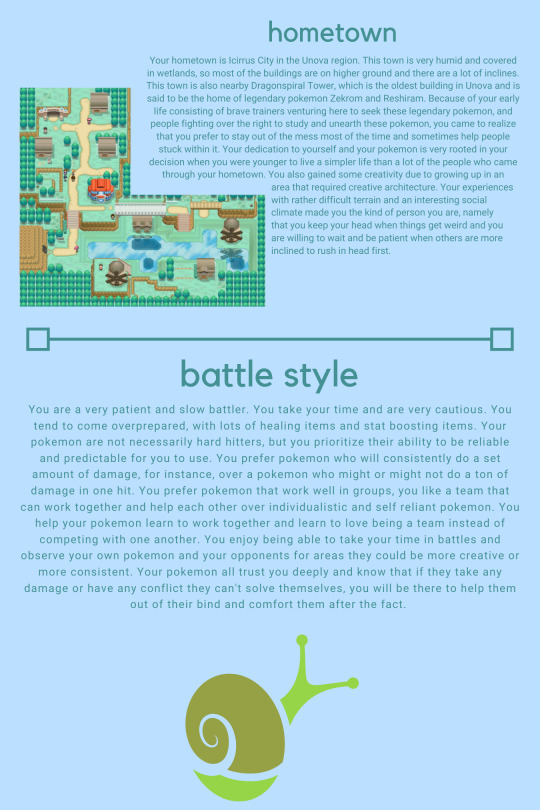
Trainer class: Nurse
You have a naturally nurturing and caring heart and mind. You like to be able to help people and take care of people, this comes from both a genuine desire to help and also a likely subconscious desire to hold that kind of power in any relationships you have. You have a lot of patience and are willing to wait for things. Nurses do not initiate battle, they will wait for people to come to them directly, and after the battle will heal their opponent's pokemon. This is similar to how you approach your relationships with people, you wait for them to come to you and then dedicate yourself to listening, helping, and diffusing problems. Some people might not really understand you and think that your way of life seems boring or irritating but the way that you view it, helping others is also helping yourself. By not going out of your way to be a rockstar pokemon trainer, you are able to better focus on what you care about, namely helping those who need help and bonding with your pokemon who are safe in your care. Your determination comes and goes, some days you are content to relax with those closest to your and your pokemon, but other days you are out trying to find new methods of helping trainers and pokemon alike. You are creative in how you help pokemon and you pride yourself on your work when you are feeling passionate
Starter: Chikorita
Your starter pokemon is Chikorita. Like you, Chikorita really loves laid back activities and taking naps. Chikorita is often found sunbathing and relaxing in comfortable spots outdoors. Chikorita spends a lot of time looking for the perfect nap conditions and once it finds them it is hardpressed to leave before having its fill of a wonderful afternoon nap. You and Chikorita spend a lot of time relaxing and napping together, and you bond over enjoying simpler activities. Chikorita's lower energy makes it a good fit for you, and it doesn't often pick fights so it will never be a cause for concern for you.
Partner: Steelix
Steelix is also a very patient pokemon, living for over 100 years sometimes, these pokemon will slowly become harder than diamonds. Steelix is also a very stubborn and very individualistic pokemon, which makes it somewhat of a challenge for you to get it to work with your other pokemon sometimes. You relate to your Steelix's desire to hole itself up in a cave somewhere and ignore any responsibility it may have, but you also relate to how it very often pulls itself out and helps out the rest of your team with you. Steelix is also fiercely protective, you so never have to worry about your other pokemon getting into trouble with Steelix around.
Team: Meganium (starter), Bastiodon, Darmanitan (zen), Dragonair, Hatterene
Hometown: Icirrus City, Unova
Your hometown is Icirrus City in the Unova region. This town is very humid and covered in wetlands, so most of the buildings are on higher ground and there are a lot of inclines. This town is also nearby Dragonspiral Tower, which is the oldest building in Unova and is said to be the home of legendary pokemon Zekrom and Reshiram. Because of your early life consisting of brave trainers venturing here to seek these legendary pokemon, and people fighting over the right to study and unearth these pokemon, you came to realize that you prefer to stay out of the mess most of the time and sometimes help people stuck within it. Your dedication to yourself and your pokemon is very rooted in your decision when you were younger to live a simpler life than a lot of the people who came through your hometown. You also gained some creativity due to growing up in an area that required creative architecture. Your experiences with rather difficult terrain and an interesting social climate made you the kind of person you are, namely that you keep your head when things get weird and you are willing to wait and be patient when others are more inclined to rush in head first.
Battle style: Slow and steady wins the race
You are a very patient and slow battler. You take your time and are very cautious. You tend to come overprepared, with lots of healing items and stat boosting items. Your pokemon are not necessarily hard hitters, but you prioritize their ability to be reliable and predictable for you to use. You prefer pokemon who will consistently do a set amount of damage, for instance, over a pokemon who might or might not do a ton of damage in one hit. You prefer pokemon that work well in groups, you like a team that can work together and help each other over individualistic and self reliant pokemon. You help your pokemon learn to work together and learn to love being a team instead of competing with one another. You enjoy being able to take your time in battles and observe your own pokemon and your opponents for areas they could be more creative or more consistent. Your pokemon all trust you deeply and know that if they take any damage or have any conflict they can't solve themselves, you will be there to help them out of their bind and comfort them after the fact.
3 notes
·
View notes
Photo
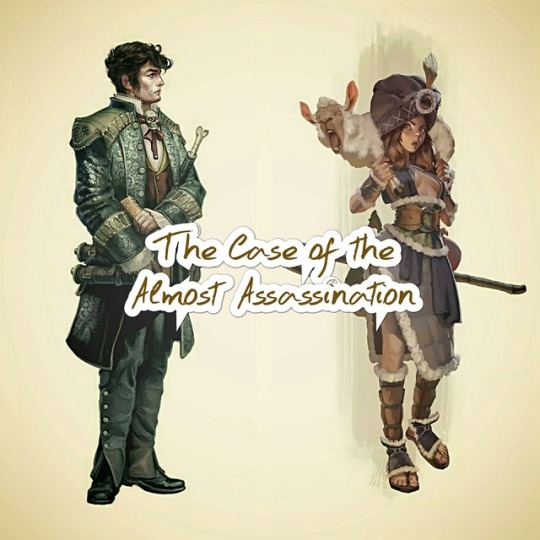
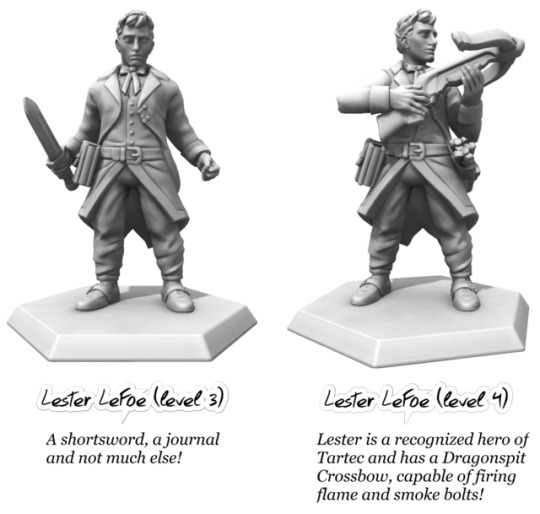
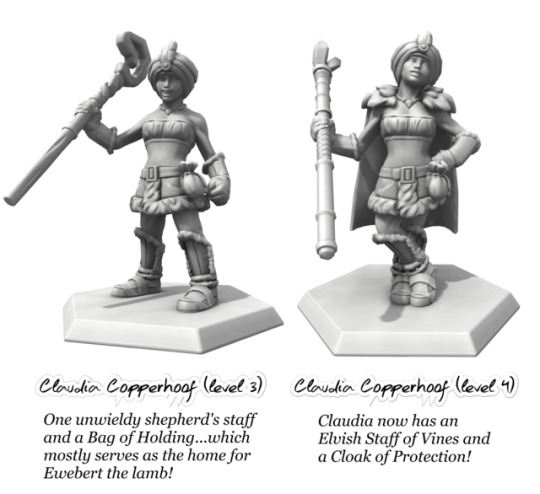
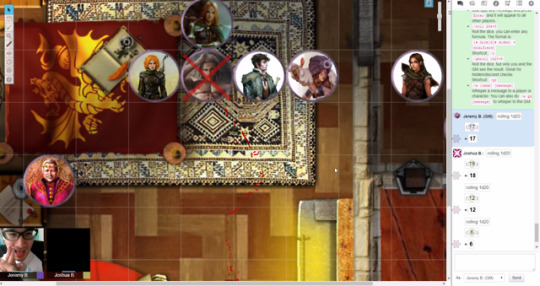
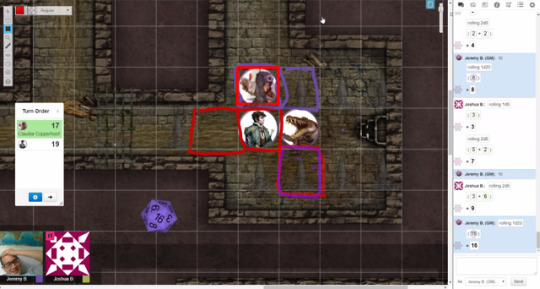
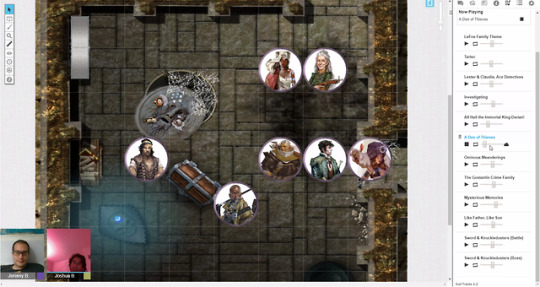
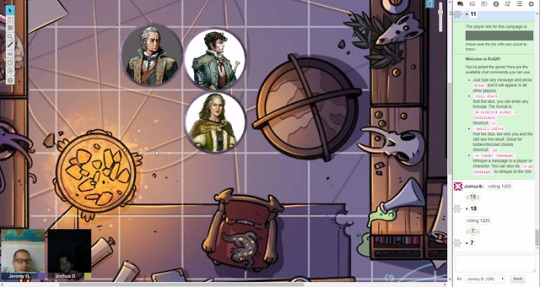
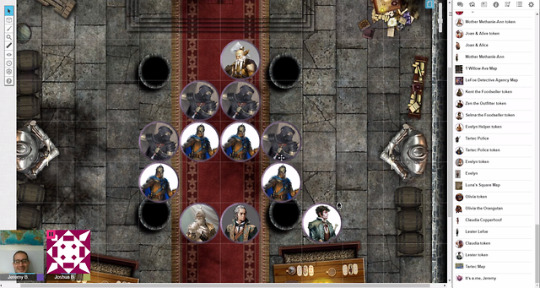


D&D With My Bro: The Case of the Almost Assassination
For the last four months, my brother and I have been playing a Dungeons & Dragons campaign that I whipped up called The Case of the Almost Assassination, and we came to a triumphant finale the other night. My bro’s called it a “steampunk mystery set in a fantasy world,” which is a good description, but on a more detailed level, the campaign was also heavily influenced by the Ace Attorney and Professor Layton games and exists in the universe of The Thirteenth Hour, a series of fantasy stories self-published by my brother that are inspired by 80s movies and cartoons. So the whole thing is one huge ball of fun nerdiness, and figuring that it might be cool to chronicle the campaign as we played, I captured each of our sessions on video. You can watch the whole thing on YouTube here in convenient playlist format (listening to it in the background like a podcast is also pretty nice, I gotta say), and there’s over 20 hours there, which is longer than some of the video games I’ve blogged about!
This wasn’t the first time that my brother and I had played D&D, since I’d previously introduced the game to him via a small four hour mini-campaign last time I visited his house. (He’s written some great thoughts on that adventure, as well as the experience of missing out on D&D in his childhood but getting the chance to discover it as an adult here.) But this was certainly the first time we’d played something long that continued from week to week, and it was also the first time we’d used virtual tabletop software - in this case the very useful Roll 20 - to play online. Minus a few minor internet hiccups, it ran smoothly, and I think both of us had a great time. The experience also made me ruminate on three interesting facts about D&D that I think not enough people write about, and I’m going to jot off a few thoughts on them here. Without further ado...
1) It is perfectly possible, and sometimes even more fun, to play D&D with just one other person.
Normally, Dungeons & Dragons conjures up images of a bunch of people - usually three or four at minimum - sitting at a table listening to instructions given to them by the Dungeon/Game Master, or DM. But the hardest part of D&D isn’t juggling rules or even fighting Challenge Rating 30 monsters - it’s getting a group of three or four people to meet up together on a consistent basis! This is why you can tell that anyone who still thinks of D&D as an activity for anti-social basement dwellers hasn’t actually played it, because in truth, the game is a demanding social commitment, especially for adults.
Thankfully, while it might be a less common way to play, you can totally enjoy D&D with just two people. Usually this means that someone more familiar with the rules has to be the DM while the other person acts as the player, which is what my brother and I did. Sometimes, the DM will also have to create a player character for themselves, and I did that in order to assist my bro with various battles and tricky scenes. This is more work for the DM, since they’ll have to juggle both their own character as well as the various non-playable characters (NPCs) encountered in the story, but if you’re up for it, it’s a rewarding exercise.
The best thing about playing D&D with just one DM and one player is how efficient it is. Three or four player D&D (to say nothing of five, six, or even more players) can get slowed down by arguments about how to progress or share loot, not to mention downtime in battles when a player who has a bazillion spells at his disposal deliberates on the one he wants to use that will both do the most damage and look the coolest. Don’t get me wrong, I actually love these sorts of interactions, but it’s also nice to strip all that fat away.
When it’s just one player and the DM, the DM also has the chance to make that player feel pivotally important by basing the story around them. Usually, the “unit” of D&D is the adventuring party, but in a one person + one DM game, the player gets to shine as the main character. Thus, it’s a good idea to choose the sort of story that can emphasize the important actions of an individual, and in my opinion the best ones for this are heavy on role-playing and character interaction rather than dungeon crawling and monster slaying. For example, a rogue adventure in an urban environment might fit the bill...or maybe even a mystery. Which leads me to my second point...
2) If you’re a DM making a homebrew campaign, try utilizing a setting that your players are already familiar with.
When my brother initially agreed to play a long campaign with me, I first thought that we might attempt one of the many published Forgotten Realms adventures that have been released for 5th Edition D&D. But then I realized that while my brother is mildly familiar with the Forgotten Realms, thanks to old comics and fantasy art from the 80s and 90s, he’s much more familiar with the setting that he created for his own fantasy novel, The Thirteenth Hour. My bro originally wrote this book when he was a high school kid and finally published it a few years ago, and in the time since, he’s written some short spin-offs and outlined ideas for a sequel. In the mini-campaign we’d played in October, his character was actually a half-elf ranger named the Wayfarer who’ll play a pivotal role in book two, and I initially pitched the whole idea of D&D to him as “Hey, this can help you brainstorm your sequel concepts before you put them down to paper.”
Once I began toying with the idea of making a homebrew campaign set in The Thirteenth Hour world, I started worrying that my brother’s universe was limited when compared to the “fantasy kitchen sink” setting of the Forgotten Realms. I mean, my bro’s book didn’t even have orcs! Or dwarves! What was I gonna do! But then I stopped being reliant on fantasy tropes and actually re-read The Thirteenth Hour, quickly finding that there was plenty I could work with.The universe that my brother created doesn’t have all of the races that Tolkien coined, but it’s still full of magic and wonder - a place where crafty old wizards inspired by The Last Starfighter’s Centauri run amok, strange technological anomalies like hover boards occasionally pop up and an otherworldly gatekeeper known as the Dreamweaver lets the spirits of the deceased visit their loved ones in dreams. And there’s also a large kingdom called Tartec ruled over by a vaguely Trump-esque king named Darian, who thinks he’s found the elixir of immortality when actually all he’s discovered is coffee. (If you think this sounds amusing, you can pick up a digital copy of my bro’s book on Amazon for less than a cup of Starbucks!)
Darian’s a funny character, and in one of the spin-off short stories that my brother wrote, an older and slightly wiser version of him reflects on how an assassin nearly took his head off with a dagger. This one sentence got me thinking who that assassin might be, and before I knew it I’d come up with the basic hook of a campaign. At the time, I was also reading Xanathar’s Guide to Everything, a D&D book that introduces 5th Edition’s Inquisitive subclass, which is basically a fantasy Sherlock Holmes. Suddenly, the ideas began bubbling in my head - the campaign would be a detective story set in Tartec with two leads trying to determine the identity of King Darian’s would-be assassins. Once I had this hook, I decided to draw further inspiration from the two video game series I think of when I hear the word “detective” - the Professor Layton games (which I like the style of but am rubbish at, since puzzles confound me) and the Ace Attorney series, which I’ve written about before. My brother would be the main character Lester LeFoe (patterned slightly after Phoenix Wright, the star of Ace Attorney), and I’d be the spunky female assistant Claudia Copperhoof (a little similar to Phoenix’s assistant Maya Fey).
I hoped that situating these characters in my brother’s world would breed a quicker sense of familiarity than he’d get from playing a generic warrior in the Forgotten Realms, and I think it’s safe to say that the experiment succeeded. Thus, even though 5th Edition D&D products all use the Realms as their default setting, it’s worth remembering that you don’t have to follow this lead, and can always tailor your campaign to a world that your players are already familiar with. In my brother’s case, he’s a writer who made his own world, but for someone else this can easily be Middle-Earth or the Hyborian Age of Robert E. Howard’s Conan books. The D&D Player’s Handbook and Dungeon Master’s Guide actively encourage modifying published adventures to appeal to your players’ favorite settings, in fact, and not only will this potentially help to decrease the amount of lore you need to explain as a Dungeon Master, but it’ll also help keep the attention of everybody listening to you. Because who wouldn’t want to insert themselves into their favorite bit of genre fiction as a legendary figure? In many ways, the whole point of D&D is to give people a framework to do that!
3) If you’re DMing for someone who doesn’t have much time to play, remember that a linear campaign is not necessarily a bad thing, and simplify the more complicated rules - making stuff up whenever necessary!
On page six of the 5th Edition Dungeon Master’s Guide, there’s a whole section entitled “Know Your Players,” which is all about altering your game to appeal to the personalities at your table. If you’re DMing for people who like acting and appreciate in-depth stories, give them plenty of role-playing opportunities and narrative twists, for instance, and if you’re dealing with folks who’d rather just make their characters look cool, try having them fight lots of monsters who reward snazzy armor and weapons.
There should really be a sub-section there entitled “How to run a game for players who are low on time.” Because that’s my brother in a nutshell. He’s a late 30s dude who works a demanding job and has two small children to take care of, one of whom is barely half a year old. (You can hear my nephew gurgling in the background in a few of our videos, and sometimes we’d even have to stop playing when the baby woke up from a snooze, which is a situation that I’m sure all new parents can relate to.) I know for a fact that my brother is also the type of guy whose eyes will glaze over when presented with a lot of complicated rules - as is probably the case for anyone who only has at most an hour or two, often in the late evening, to sit down to play a game when the rest of the family is in bed.
In my opinion, the way to tailor your game to such a player is to make a brisk, well-paced story that they can actually see to a satisfying conclusion. This means that the campaign might be fairly linear - a word which seems to have bizarre negative connotations to some D&D players out there, who are always ranting about “railroading,” which is when a DM puts players down a predetermined path without any wiggle room. I think it’s important to note that “linear” does NOT necessarily equate to “railroading,” however, and that a sprawling campaign with a trillion different outcomes and choices to make at every interval isn’t necessarily the best approach for someone who can only play a little bit each week and might get bored if they feel like they aren’t making tangible progress.
Let me put it this way - the campaign that I made for my brother was tightly designed. Instead of giving Lester and Claudia a vast landscape to explore, everything was confined to the city of Tartec, and I made an effort to nudge the characters towards certain objectives that they had to complete in order to solve the mystery, such infiltrating a manor house in the upper class section of town. But I also made sure to flesh out these few areas (quality over quantity) and allowed a certain degree of freedom in how the objectives could be cleared. For instance, I initially thought that Lester and Claudia might sneak into the manor house through the sewers. But as I was brainstorming strategies with my bro, the topic of disguises came up, because Claudia owned a disguise kit. And eventually we decided to infiltrate the party with Lester masquerading as a nutty old lady and Claudia as his keeper, which was a fun improvisation that I never would’ve anticipated - but still a viable way to complete the main objective that didn’t negatively impact the story’s pacing.
On the topic of keeping the pace of the story brisk for a player low on time, I feel like it’s also important to minimize the number crunching and reduce D&D’s more complicated rules whenever possible. In practice, this meant that I took care of as much behind-the-scenes stats management as possible so my bro wouldn’t have to, though I did always try to explain to him what was going on (and what all of those funky dice rolls meant) so he’d have some understanding of the game’s mechanics. Also, whenever we were in a situation where I wasn’t sure of a rule, instead of wasting time looking at the Player’s Handbook, nine times out of ten I’d just make something up on the fly. For example, our adventure had a friendly NPC orangutan in it (specifically chosen because I know my brother likes backflipping primates) and she was supposed to be a super strong, unpredictable force of nature in the final battle. I’d lost the stats that I’d used for her when she first appeared, and instead of looking for them, I decided to just roll a d20 for her damage, figuring that the end result would be close enough. In that same vein, there were a few instances where I made mistakes, since I’m still a relatively new DM. Once I totally miscalculated a character’s special attack, leading to a funny NPC death (which I’d expected but not exactly in that way) and on multiple occasions I flat out forgot to apply modifiers to attack rolls. But instead of going back to redo everything I’d either just laugh it off or forge ahead, hoping that my bro didn’t notice, which he never did.
Ultimately, my philosophy for DMing is to not sweat the small stuff TOO much if it probably doesn’t matter in the long run, especially if you’re running a game for just one person whose free hours are precious. I believe this sort of approach might be sacrilegious to some of the more rules-oriented DMs out there, like the ones who spend hundreds of words arguing over damage variables on the D&D Subreddit. But I’m not one of those folks, and I’d prefer to follow the advice of Sly Flourish, a DM who has a great website where he advocates a “lazy” style of Dungeon Mastering which de-emphasizes nitpicking over rules in favor of just having fun.
At the end of the day, having fun is what D&D is all about. It’s a game of make believe that can really bring out your inner storytelling-loving child, and in an era where very few adults are encouraged to even consider the concept of “make believe,” it can be a truly wonderful breath of fresh air. And if you don’t believe me...I encourage you to watch The Case of the Almost Assassination and try not to crack up at some of the situations that Lester LeFoe and Claudia Copperhoof found themselves in. :)
The pics above are either art that I assembled for our adventure or screenshots that I took while we were playing! The little figurines I designed via HeroForge.
#pixel grotto#musings#video games#dungeons & dragons#dungeons and dragons#d&d#dnd#d&d 5e#5e#roll20#roll 20#tabletop gaming#roleplaying game#rpg#the thirteenth hour#thirteenth hour#phoenix wright#ace attorney#professor layton#layton
9 notes
·
View notes